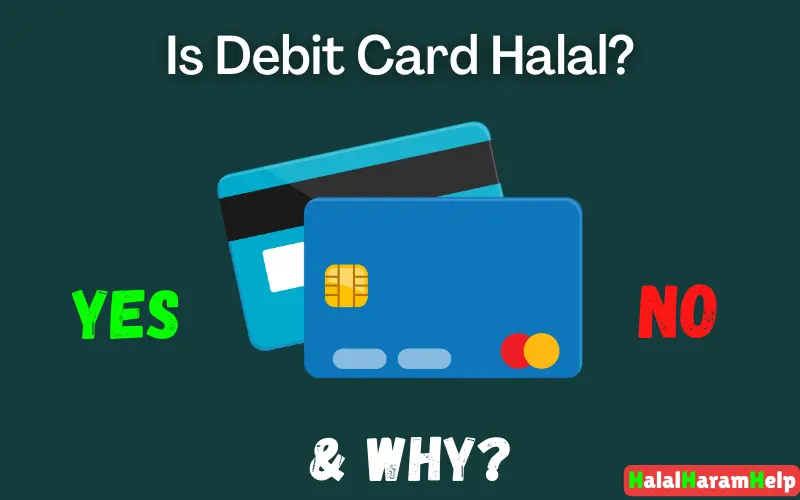In today’s rapidly evolving financial landscape, the use of debit cards has become universal from online to offline.
These convenient pieces of plastic offer a cashless way to manage everyday transactions, providing ease and efficiency for users worldwide.
However, for Muslims striving to adhere to Islamic principles in all aspects of life, including financial dealings, arises a question is debit card halal?
If you’re searching the same this article will answer all your queries. So let’s get started.

Is Debit Card Halal?
Yes, debit cards are generally considered halal.
Unlike credit cards, which involve interest-based transactions prohibited in Islam, debit cards allow users to spend only what they have in their bank accounts.
This ensures that no riba (interest) is involved, as transactions are conducted using the user’s existing funds.
However, it’s important for Muslims to ensure that their bank operates in accordance with Shariah principles, avoiding any interest-bearing accounts.
By using a debit card linked to a Shariah-compliant bank account, Muslims can confidently manage their finances while adhering to Islamic guidelines.
Most of the conventional bank debit card is allowed to be used considering Islamic principles.
You can also see is debit card halal.
What Is A Debit Card And Why It is Halal?
A debit card is a financial tool linked directly to the user’s bank account, allowing for electronic transactions and cash withdrawals.
When a purchase is made using a debit card, the money is immediately deducted from the account, ensuring that the user only spends what they already possess.
This direct spending mechanism is why debit cards are considered halal.
Islamic finance prohibits riba, or interest, and emphasizes transactions backed by tangible assets and clear ownership.
Since debit cards do not involve borrowing money or accruing interest, they align with these principles.
Furthermore, using a debit card does not incur debt, avoiding the potential for financial practices that conflict with Islamic teachings.
Thus, as long as the associated bank account is free from interest and complies with Shariah law, a debit card is a permissible financial instrument for Muslims.
Benefits Of Using A Debit Card Over Credit Card
Choosing between a debit card and a credit card can significantly impact your financial health and adherence to Islamic principles.
Here are some key benefits of using a debit card over a credit card, particularly from an Islamic perspective:
1. Avoiding Riba (Interest)
One of the fundamental principles of Islamic finance is the prohibition of riba or interest. Credit cards often involve interest charges on unpaid balances, which is considered haram (forbidden) in Islam.
In contrast, debit cards operate on a pay-as-you-go basis, ensuring that you only spend what you have in your bank account without incurring any interest.
2. Promoting Financial Discipline
Debit cards help promote financial discipline by limiting your spending to the amount available in your bank account.
This can prevent overspending and encourage better budgeting, as you are more likely to keep track of your account balance and manage your finances responsibly.
3. Avoiding Debt Accumulation
Credit cards can lead to debt accumulation if not managed properly, as they allow for borrowing beyond one’s immediate financial means.
Debit cards eliminate this risk since transactions are funded directly from your available balance.
4. Simplified Budgeting and Tracking
Debit card transactions are directly reflected in your bank account statements, making it easier to track and manage your expenses. This transparency helps in maintaining a clear and accurate budget, which is essential for effective financial planning and management.
5. Lower Fees and Charges
Using a debit card typically incurs fewer fees compared to a credit card. Credit cards often come with various charges, including annual fees, late payment fees, and interest charges on outstanding balances.
6. Peace of Mind
For Muslims concerned about adhering to Islamic financial principles, using a debit card provides peace of mind. By avoiding interest and debt, you can confidently manage your finances in a manner that aligns with your religious beliefs.
In summary, using a debit card offers numerous benefits over a credit card, particularly for those adhering to Islamic principles.
By avoiding interest, promoting financial discipline, and preventing debt accumulation, debit cards provide a halal and practical means of managing everyday expenses.
Conclusion
In summary, debit cards are a halal and practical financial tool for Muslims, aligning with Islamic principles by avoiding riba (interest) and promoting financial discipline.
They offer numerous benefits over credit cards, such as preventing debt accumulation and simplifying budgeting.
We hope this post has clarified the permissibility and advantages of using debit cards in Islam.

